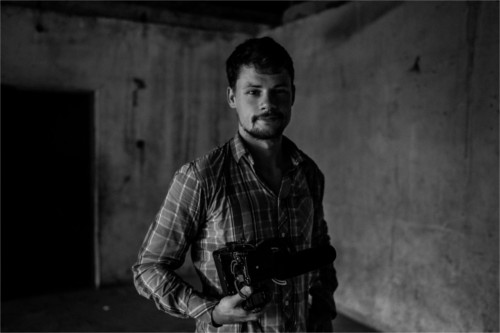 Jim Huylebroek is a freelance photographer currently based in Kabul, Afghanistan. His work has been published by a range of organizations and news outlets, including The New York Times, The Guardian, Al Jazeera, The Washington Post, Bloomberg, Der Spiegel, The Telegraph, VICE, UNICEF, UNHCR, The Norwegian Refugee Council and others. He has reported on a range of stories, including following opium production and smuggling from Afghanistan to Western Europe, and exploring the aftermath of conflict in Mali. His first photo book, Afghanistan: Unsettled – Three Years Documenting Afghans on the Move, was published in 2018.
Jim Huylebroek is a freelance photographer currently based in Kabul, Afghanistan. His work has been published by a range of organizations and news outlets, including The New York Times, The Guardian, Al Jazeera, The Washington Post, Bloomberg, Der Spiegel, The Telegraph, VICE, UNICEF, UNHCR, The Norwegian Refugee Council and others. He has reported on a range of stories, including following opium production and smuggling from Afghanistan to Western Europe, and exploring the aftermath of conflict in Mali. His first photo book, Afghanistan: Unsettled – Three Years Documenting Afghans on the Move, was published in 2018.
Hometown: Antwerp, Belgium.
Education: Bachelors degree in Photography from Karel de Grote College, Antwerp, Belgium.
Languages you speak: English, Dutch, French, Spanish, German, Persian, Pashto (not fluent).
First job in journalism:
Freelancer (still am).
Countries reported from: Afghanistan, Iraq, Somalia, Mali, Nigeria, Iran, Turkey, Greece, Bulgaria, Serbia, Kosovo, Bosnia, Croatia, Germany.
When and why did you join the OPC:
In 2016. I had been asked for identification by security forces during reporting a couple of times, and decided it was time to get a press card.
What drew you to Afghanistan?
The conflict, the natural beauty and the people. I was looking for a place to begin my career as a photojournalist after doing a graduation project about the conflict in Mali and its impact on civilians. It was the end of 2014 and a big troop drawdown of U.S. and NATO forces was happening in Afghanistan. Since many of the foreign press left too, I figured there would be space for me to get started.
Major challenge as a journalist: Confidence.
Best journalism advice received:
Not really advice, but I learn a lot from conversations with more experienced colleagues.
Worst experience as a journalist: Emails from outlets claiming to have no budget but offering to publish photos for “exposure.”
When traveling, I like to …
Go to isolated places without phone or Internet coverage, since I can then catch up on editing backlogs. When I’m in Kabul there’s always something on, which doesn’t facilitate time management.
Journalism heroes: The men and women who cover their own country’s conflicts despite the risks. The fixers, interpreters and drivers, who often don’t receive praise.
Hardest story: A story on the deadly toll on a family after a group of its children found an unexploded rocket near their house.
Advice for journalists who want to work overseas: I don’t feel like I’m in a position to give advice yet, but if I would: Find a place you’re interested in and give yourself the time to learn about it. Know that it requires an investment. Keep in mind potential risks.
Favorite quote:
I and the public know
What all schoolchildren learn,
Those to whom evil is done
Do evil in return.
– W.H. Auden
Place you’re most eager to visit:
Colombia/Venezuela.
Most common mistake you’ve seen: Having preconceived notions about the “frame” into which a story fits – it’s always apparent in the final product.
Country you most want to return to: Mali, to revisit the people who were so helpful when I came there without money or experience during my studies..
Twitter handle: @jimhuylebroek
